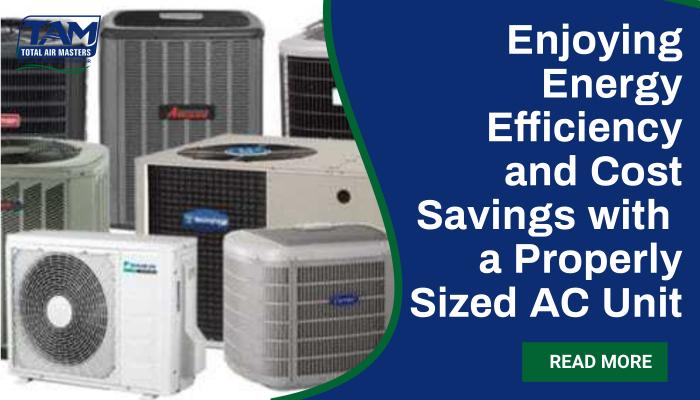
When it comes to home air conditioning, more oversized isn’t always better. Choosing the right size for your air conditioning unit is paramount, as it significantly impacts your system’s energy efficiency, comfort, and cost-saving potential. Installing an AC unit that is too large or too small for your home can lead to numerous complications, resulting in decreased energy efficiency, reduced system longevity, and increased utility costs. To help you make informed decisions about AC sizing, we aim to provide valuable insights and guidance on the importance of selecting the appropriate size AC unit for your home.
In this comprehensive post, we’ll discuss the key factors to consider when determining the right size for your air conditioning unit. From understanding cooling capacity to recognizing the risks associated with improperly sized units, you’ll gain a thorough understanding of the role AC sizing plays in energy efficiency and cost savings. We’ll also share expert tips for selecting and installing the perfect AC system based on your unique comfort needs and home specifications.
Determining the Right Size: Cooling Capacity and Your Home’s Needs
To find the perfect AC unit size for your home, it’s crucial to understand cooling capacity, measured in British Thermal Units (BTUs) per hour. Essentially, BTUs represent the amount of heat your air conditioner can remove from your home each hour. Several factors can influence the BTU capacity needed for optimal comfort and efficiency:
1. Square Footage: The size of the area you need to cool is the most critical factor when determining your ideal AC unit sizing. Generally, larger rooms require units with higher BTU capacities.
2. Climate: Your geographical location and climate will also impact the necessary cooling capacity. If you live in a hot, humid area, you may require a higher BTU capacity than those in more temperate regions.
3. Insulation: Proper insulation can have a major impact on the efficiency of your air conditioner. A well-insulated home holds in cold air more effectively, reducing the workload for your AC unit. Therefore, if your house is poorly insulated, you may need a system with increased BTU capacity.
4. Occupancy and Heat-Generating Appliances: The number of occupants and heat-generating appliances in your home can also affect cooling capacity needs. More occupants and appliances will produce more heat, requiring increased BTUs for optimal cooling.
Risks of Improperly Sized AC Units
An AC unit that doesn’t match your home’s cooling requirements can have a number of negative consequences:
1. Reduced Energy Efficiency: When an improperly sized AC unit must work harder to maintain temperature settings, it consumes more energy, resulting in inefficiencies and higher utility costs.
2. Reduced Comfort: Oversized AC units may cycle on and off too frequently, leading to inconsistent temperatures, while undersized units may struggle to maintain desired comfort levels during hot summer days.
3. Increased Wear and Tear: An improperly sized system may have a shorter lifespan due to increased component wear and more frequent breakdowns.
4. Humidity Issues: Oversized AC units can’t effectively remove humidity from your home, as they don’t run long enough to achieve ideal dehumidification. On the other hand, undersized units may struggle to keep up with the moisture in the air, leading to a damp, clammy environment.
Professional Load Calculation: Finding the Perfect Sized AC Unit for Your Home
To ensure optimal energy efficiency, comfort, and cost savings, it’s crucial to perform a professional load calculation to determine the appropriate AC unit size for your home. Professional load calculations involve analyzing your home’s unique characteristics and cooling requirements to provide a precise recommendation for the perfect AC size. Here’s what to expect during a load calculation:
1. Home Inspection: A professional technician will conduct a thorough evaluation of your home, assessing key factors such as square footage, insulation quality, window size and location, and your home’s overall layout.
2. Data Analysis: The technician will use the collected information to compute your home’s cooling capacity requirements.
3. System Recommendation: Based on the calculated cooling capacity, the technician will recommend an appropriate AC unit size, ensuring that it’s not too big or too small for your home.
Choosing the Right AC Unit: Efficiency Ratings and Selecting the Ideal System
Once you’ve determined the appropriate size for your AC unit, it’s essential to consider the unit’s efficiency ratings. Modern air conditioners come with Seasonal Energy Efficiency Ratio (SEER) ratings, which measure their cooling efficiency. A higher SEER rating indicates better energy efficiency and thus, lower utility costs.
When selecting the ideal AC system, opt for a unit with a high SEER rating and the right cooling capacity to ensure maximum energy efficiency, comfort, and cost savings.
Embrace the Advantages of a Properly Sized AC Unit for Your Home
Selecting the right size for your air conditioning unit is critical to achieving optimal energy efficiency, comfort, and cost savings. By thoroughly understanding cooling capacity, accurately assessing your home’s cooling needs, and investing in a professional load calculation, you can ensure that your AC unit is perfectly tailored to your home’s unique requirements.
Don’t underestimate the importance of proper AC sizing and professional AC services in Katy. Embrace the benefits of increased efficiency, reduced utility bills, and enhanced comfort that come with a properly sized unit. When you’re ready to explore your AC unit options, Total Air Masters is here to provide expert guidance and assistance in selecting the perfect system for your home. Contact us today.
